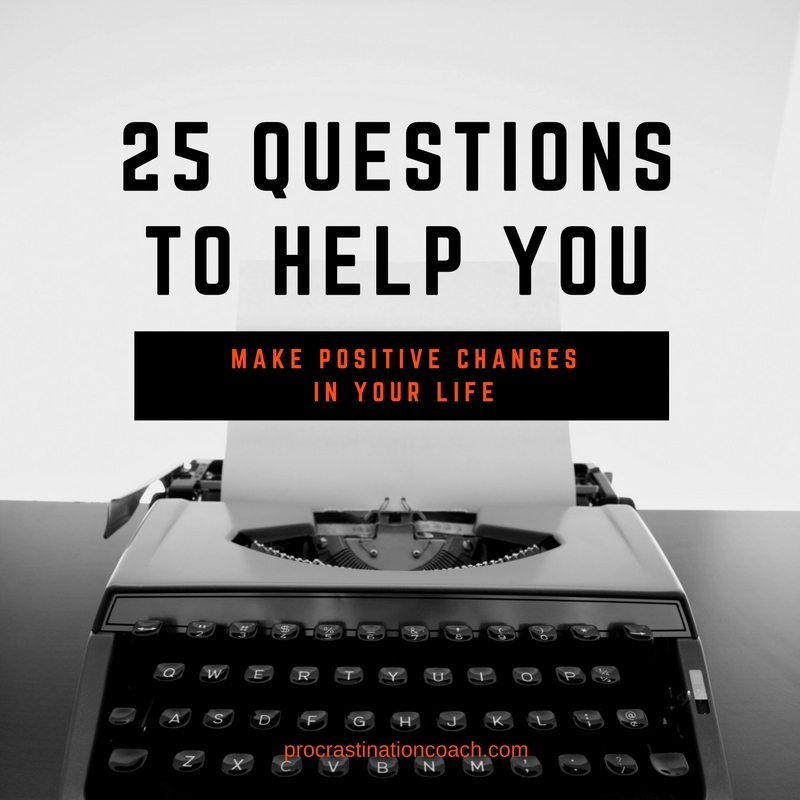Have you ever wondered why it can feel so difficult to make positive changes in your life?
What I have learned from working with my psychotherapy and coaching clients over the past 20 years is this — None of us is lacking in desire to make positive changes. It is the whole reason why people seek out psychologists and coaches in the first place. Always has been, always will be.
So, if the desire to make positive changes is not lacking, what blocks us from going forward with our plans and wishes?
My answer is PROCRASTINATION.
The more I think about the topic of Procrastination, the more I realize it underpins so many of our difficulties and problems. Procrastination can be at the root of relationship troubles, financial predicaments, communication missteps, major health issues, and of course, productivity decline.
When we become a little too comfortable with Procrastination being a part of our operating system, we become vulnerable to its numbing effects. As Procrastination lingers in our lives, we start to not see problems for what they are. We start to not clean up simple messes. We start to avoid communicating as effectively and promptly as we can.
And then we have trouble making sense of our situation. Each of our difficulties starts to blend into the next, and we become unclear. That is the block that prevents us from making positive changes even though we know we should or we want to quite badly.
25 Questions to Help You Make Positive Changes in Your Life
Ask yourself these questions in order to determine the extent to which Procrastination has entered into your life:
- Do you tend to feel overwhelmed when you look at your workspace?
- Do you feel like you have too much to do at any given time?
- Is it hard for you to focus because your mind is filled with thoughts about what you haven’t yet finished?
- Do you dread being contacted by other people for fear of what they’ll say?
- Are you self-critical?
- Do you feel you are efficient at getting out of your home in the morning?
- Is your bedroom a calm place to be?
- Do you feel panicky often?
- Is it difficult for you to relax?
- Do you feel like you cannot pay full attention to people who are talking to you because you are preoccupied with something else?
- Do you tend to be late to appointments?
- Do you fear failure often?
- Do you speak in public situations easily?
- Do you fantasize about having someone rescue you from your stress?
- Do you have difficulty letting other people know you need help?
- Do you have unfinished projects because you are trying to perfect them?
- Is it difficult for you to focus for more than 15 minutes at a time?
- Do you estimate time well?
- Are you afraid of being seen as incompetent or irresponsible?
- Do you have difficulty saying “no” to requests that don’t suit your needs well?
- Do you have difficulty saying what you mean in a direct manner?
- Are you involved in projects or activities that you feel are a waste of your time?
- Do you wonder why you spend as much time as you do running errands or shopping?
- Is your closet overflowing?
- Do you feel you have to tell people untruths to make them feel better or to make yourself look better?
I made the list of questions above to show you how the dynamics of Procrastination work. They:
- make us doubt ourselves
- make us misspeak
- make us off-synch with time
- cause us to feel stressed
- cause us to feel uncomfortable in our spaces
- cause us to feel nervous when we are with people and when we are alone
- cause us to feel distracted
- cause us to feel insecure
- cause us to feel exhausted
- cause us to feel unfocused
To sum it up, Procrastination can be a very toxic factor in our lives and can prevent us from making positive changes. We may think to ourselves, “Oh, I just have an issue with clutter,” but the single issue of clutter is a symptom of the larger issue of Procrastination and delayed action.
Whenever we delay action, there is a consequence. When we Procrastinate too much, we are forced to deny the consequences in order to feel okay. If our eyes were really open, we would feel uncomfortable about putting so many things off into the future.
Procrastination causes anxiety. Each of us should work diligently to keep anxiety at bay. It’s just a killer. A killer of creativity, of courage, of individuality, of spirit. When you remove anxiety from your mind-space, you create room to make positive changes.
Yes, you can make positive changes too
Pick the ONE question that really jumped out at you from the list of 25. You know, the one that made you startle or think twice.
Make a plan to resolve that area of difficulty or unease and make that your focus. Make it happen. You will find yourself feeling relief once you make your problem disappear. You will also set the stage for making positive changes (and not Procrastination) a habit.
If you need assistance, ask for it and seek it out with the right person. Or a few people even. It will be worth your time, energy, and resources to learn how to get rid of your Procrastination and to feel like you are in flow instead. Go get ’em.
News to Share:
1. I’ve been enjoying the cameraderie and engagement in the Procrastination Coach Facebook Group that has been growing steadily week to week. If you’d like support for your efforts to defeat Procrastination, please join us in the Procrastination Coach Facebook Group.
2. I recently compiled a group of 13 free downloads that are useful to Procrastinators who are interested in finding new ways to organize their morning, their plans, and their schedule (and more). Register here to receive the password for all of the downloads in the Free Resource Library:
Click Here to Get Access


